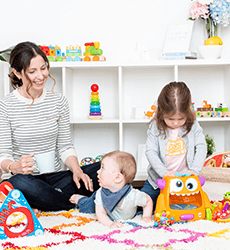 We all learn about the importance of sharing at a young age. Maybe you were in Girl Guides and remember the “Spark Promise”: I promise to share and be a friend. Or, maybe you remember learning the whole idea that sharing is caring. Sharing is a dynamic life skill that teaches teamwork, compassion, understanding, and patience, and it’s a skill that is practiced throughout our whole life.
We all learn about the importance of sharing at a young age. Maybe you were in Girl Guides and remember the “Spark Promise”: I promise to share and be a friend. Or, maybe you remember learning the whole idea that sharing is caring. Sharing is a dynamic life skill that teaches teamwork, compassion, understanding, and patience, and it’s a skill that is practiced throughout our whole life.
How often do you find yourself sharing tools or kitchen necessities with your neighbours? What about lending that dress or fancy tie to your best friend? It’s even likely you’ve shared your little one’s hand-me-downs with family and friends. The reasons for sharing these things? Less consumption, less money spent and a great way to give your “things” a chance at new love and attention.
Sharing is all around us and when goods and services are shared as part of a business, it’s known as a sharing economy. The Play Société toy library is exactly that.
There are so many reasons why sharing is so important, especially when it comes to sharing toys and kid gear, but here are three main reasons:
1. Own less and enjoy more.
How much do you really need to own? If you think about it, you don’t really need that much. When you look around your home, how many toys are your kids really playing with? When we own less and share more, our living spaces become less cluttered and less clutter produces a sense of peace and joy. Just think of how much time you can save on tidying your home!
2. Save money.
Sharing helps to save money. Less new toy purchases = less money spent. Easy as that! At the end of the day, spending money on new toys isn’t an investment. The moment you take it out the box, those toys depreciate in value.
3. Reduce consumption.
Sharing toys helps in reducing your material consumption. Did you know reducing consumption and waste has one of the biggest environmental impacts!?


 P.S. – Teach your children about the importance of sharing by demonstrating it yourself. Join our incredible community of other like-minded parents and guardians who are owning less, sharing more, saving money and reducing consumption.
P.S. – Teach your children about the importance of sharing by demonstrating it yourself. Join our incredible community of other like-minded parents and guardians who are owning less, sharing more, saving money and reducing consumption.